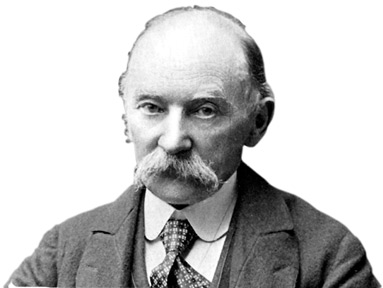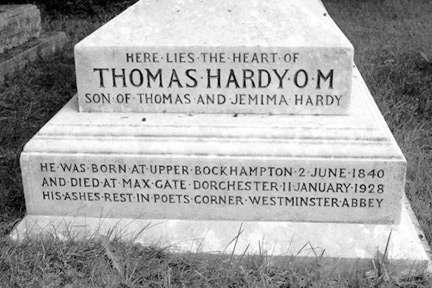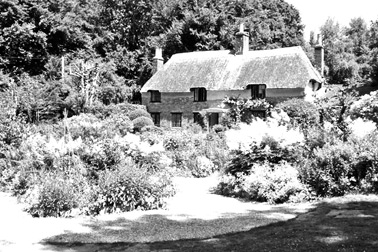Fatalism and alienation play a dominant role in Hardy's novels
by W.T.J.S. Kaviratne - Ambalangoda Spl. Cor.
Thomas Hardy, a Victorian novelist, poet and a short story writer was
born in 1840 in the village of Higher Bockhampton in Stinford near the
town of Dochester, England.
Hardy wrote 14 novels including Under the Greenwood Tree (1872) Far
from the Madding Crowd (1874), The Return of the Native (1878), The
Mayor of Casterbridge (1886), Tess of d'Urberviile(1891) and Jude the
Obscure (1895).
|

Thomas Hardy |
In addition, he composed several volumes of poetry and a poetical
drama Dynasts.
Hardy said 'non-rationality seems to be the guiding principle of the
universe and blind forces control human destiny and human action has
been pre-determined either by the very nature of things or by God or
fate.
Human will is not free and it is always found fettered.'
In Mayor of Caster bridge, the protagonist Michael Henchard sells his
wife and baby daughter to a sailor under the influence of liquor.
After 18 years the family finds him as a prominent figure in
Casterbridge.
Fate
Hardy depicts through the behaviour of his characters in his novels
that fate is seemingly unfair, unforeseen and merciless and it is
responsible for the doom and miserable end of the affairs of humanity.
Michael Henchard became a victim of the unbridled forces of fate and
he took a hasty decision to sell his wife and baby daughter.
Hardy attributes this sudden unethical, inhumane and immoral decision
of Henchard is fatalistic and all human actions being controlled by an
impersonal force, destiny or fate independent of humans and gods.
Hardy portrays one of the major flaws of humanity through Henchard
lacking foresight in predicting future consequences of the rash
decisions taken by him in the present.
Coincidences and circumstances had been frequently exploited by Hardy
as literary devices to bring in the theme of fatalism to his novels.
In the tragedy 'Tess of the d'Urbervilles' fate and injustice have
also played striking roles in the tragic end of its protagonist and
heroine Tess.
Aristocratic family
John Durbyfield, the father of Tess, found that he was the last
remaining member of an aristocratic family known as d' Uberville. The
setting of the novel Tess of the d'Urbervilles was in Wessex in the
south of England and John Durbyfield was on his way home after work when
he encountered a neighbour Parson Tantridge who revealed John
Durbyfield's family history and genealogy.
Parson Tantridge who told this asked Durbyfield not to disturb
Durbyfield with such a useless piece of information but Tess's father
failed to control his impulses and first revealed it to Tess and his
wife.
Revelation of the past family history of Durbyfield by Tantridge and
the first meeting of Tess and Angel Clare at the village 'May Dance'
coincided.
Tess visiting d'Urbervilles would not have taken place if their horse
had not been fatally wounded.
Tess would not become a victim of Alec if she had refused going to
his place, however, much her father encouraged of visiting her distant
relations as told by Tantridge.
 If Tantridge did not reveal the family history of Durbyfield, Tess
could not be aware of the distant connections with d'Urberville family. If Tantridge did not reveal the family history of Durbyfield, Tess
could not be aware of the distant connections with d'Urberville family.
Thomas Hardy has used all these as coincidences , chance events
unleashed by fate or some other unseen force beyond the control of man.
Tess was the oldest child of John and Joan Durbyfield and they were
simple rural peasants.
Tragedies
The exposure of this piece of information triggered a series of
tragedies beginning with the death of family horse which persuaded her
even with reluctance to go in search of d'Urberville family seeking a
job and the rape of Tess by Alec d'Urberville and her killing of Alec
and the final execution of Tess.
All the events that unfolded throughout the novel from the beginning
to the end are unavoidable under the circumstances and beyond the
control of the characters.
Tess wrote a letter to Angel telling him of her past, but instead of
pushing it under his door, she unwittingly pushed it under the rug on
the floor in the room.
If only he could have found it and read it before they were married.
If Angel Clare could have danced with Tess that Spring day when they
first met.
As the author and the narrator of the novel, Hardy has introduced
numerous coincidences and sudden changes in the plot affecting the fate
of its main character Tess and at the same time
Hardy himself exposes the injustice.
The community condemned Tess for her rape but which was not her sin
it was rather Alec who raped her. On the execution of Tess, Hardy
believed that society, some external force, an unseen hand or a god had
been working from the beginning to the end against Tess.
Seduction
Similarly, the abandonment, seduction, desertion and murder of the
characters in Hardy's novels had been instigated by an unforeseen force
beyond the control of the characters.
Hardy's belief that the forces that rule humanity are absolutely
unpredictable and they are mere coincidences and chance events are
portrayed in almost all his novels.
For Hardy ' the earth is a blighted star without hope.'
At the end of the novel after the death of Tess, Hardy takes the
opportunity to be sarcastic on the Christian idea of God using
expressions such as ' Justice was done ' - President of the Immortals.'
Alienation and human isolation are among the major themes Hardy tried
to attribute mainly to the transition of rural agricultural society
towards the industrialisation and modernism.
Hardy has portrayed isolation and alienation through Boldwood who was
serving a life imprisonment for killing Troy in Far from the Madding
Crowd. The character Clym in Return of the Native has become a modern
man and when he returned to the rural setting of Egdon Heath found it
difficult to communicate with the neighbours and he had to live in
isolation.
The fatalistic view of Hardy on life is vividly portrayed by the
characters in his tragedy The Return of the Native.
'
|

Thomas Hardy's birthplace |
Chance and coincidence drives the life and man has no right to
change its way.
Greek tragedies
The theme of Hardy is close parallels to the themes of Greek
tragedies.
It was fate that brought the heroin of the novel, charming and
beautiful Eustacia and Clym together.
She could not tolerate the loneliness of Egdon Heath and her dreams
of living in a pompous city such as Paris with Clym were shattered when
as a result of the incompatibility of the temperaments of Eustacia and
Clym their marriage ended in doom.
Just like the letter kept by Tess which never reached the hands of
Angel Clare , the letter sent by Clym from Paris begging Eustacia to
join her in Paris was too late when she received it.
It was again fate that played a major role in the tragedy of Return
of the Native.
Eustacia once made a premonition, 'Tis my cross, my shame, and will
be my death.' Circumstances forced Eustacia to stay in Egdon Heath and
at the end Eustacia fell in love with Wildeve.
Eustacia in Return of the Native was consistently leading a life of
isolation in Egden Heath the setting of the novel and finally which
paved the way for her to commit suicide.
In Mayor of Casterbridge alienation of Michael Henchard was due to
his own behaviour and character traits.
In 'Tess of the Urberville when Angel Clare rejected Tess she
realised the oppressive and cruel nature of society and she herself
became a victim of alienation and isolation.
Marriage
She discovered through comparison of her childhood experiences in her
agricultural village of Marlott with her life later in Trantridge.
Through the characters of many of his novels Hardy conveys the
message that the institution of marriage involves a commitment that many
people found it difficult to fulfil.
In Jude the Obscure the character Jude Fawley knew that marriages in
their family were ill-fated and ended in failures.
Just after murder-suicide committed by one of the children of Jude
and Sue named' Little Father Time' Sue became more and more religious.
In addition to the analysis of the roles played by fate, chance,
coincidence and alienation in the affairs of humanity, Thomas Hardy has
also exposed the sexual hypocrisy that existed in the society of England
during the Victorian age through the characters of his novels. |

